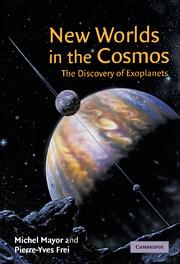Book contents
- Frontmatter
- Contents
- List of figures
- Preface
- Acknowledgements
- 1 The quest begins
- 2 Infinity and beyond
- 3 New arrivals in the Solar System
- 4 Why stars wobble
- 5 Neutron planets
- 6 Brown dwarfs in the headlines
- 7 Sirens in the Cosmos
- 8 Foreign planets different to our home-grown ones
- 9 Destination: earths!
- 10 Further yet: life
- Appendix. Properties of the exoplanets
- Glossary
- Bibliography
- Plate section
8 - Foreign planets different to our home-grown ones
Published online by Cambridge University Press: 06 July 2010
- Frontmatter
- Contents
- List of figures
- Preface
- Acknowledgements
- 1 The quest begins
- 2 Infinity and beyond
- 3 New arrivals in the Solar System
- 4 Why stars wobble
- 5 Neutron planets
- 6 Brown dwarfs in the headlines
- 7 Sirens in the Cosmos
- 8 Foreign planets different to our home-grown ones
- 9 Destination: earths!
- 10 Further yet: life
- Appendix. Properties of the exoplanets
- Glossary
- Bibliography
- Plate section
Summary
Think of a scene rare on home-grown European TV, but common in the USA, which abounds with images of games of skill. Tenpin bowling is a highly refined art to those who are experts. In this sport, there's science in every step. From the calculation of the trajectory to the study of the resistance of the lanes, which are not uniformly rough. You can empathise with the fact that many years of skill are required to add the correct spin to the ball in order to attain, at the end of the lane, just the right curve which lets it hit the pins just slightly to the side in order that they fall like dominoes.
For beginners, the feat is infinitely more difficult. Either the ball, clearly wanting to be uncooperative, rushes off into the gulley, or else in spite of a nice, straight and apparently effective trajectory, it only removes the middle pins, leaving two separate groups of survivors, thereby removing all hope of cleaning out the set on the second throw.
So, frustration is often the lot of the novice, who is left with no option other than to persist in the hope that maybe one day. … Luckily, novices can count on an irregular ally: chance. Nothing seems to distinguish one bowl from the previous ones, yet miraculously the ball starts out in the lane, glides smoothly along before arriving at the rough bit, which it rapidly grasps, and perfectly curves its trajectory in just the way needed to leave no pin standing.
Information
- Type
- Chapter
- Information
- New Worlds in the CosmosThe Discovery of Exoplanets, pp. 156 - 180Publisher: Cambridge University PressPrint publication year: 2003
